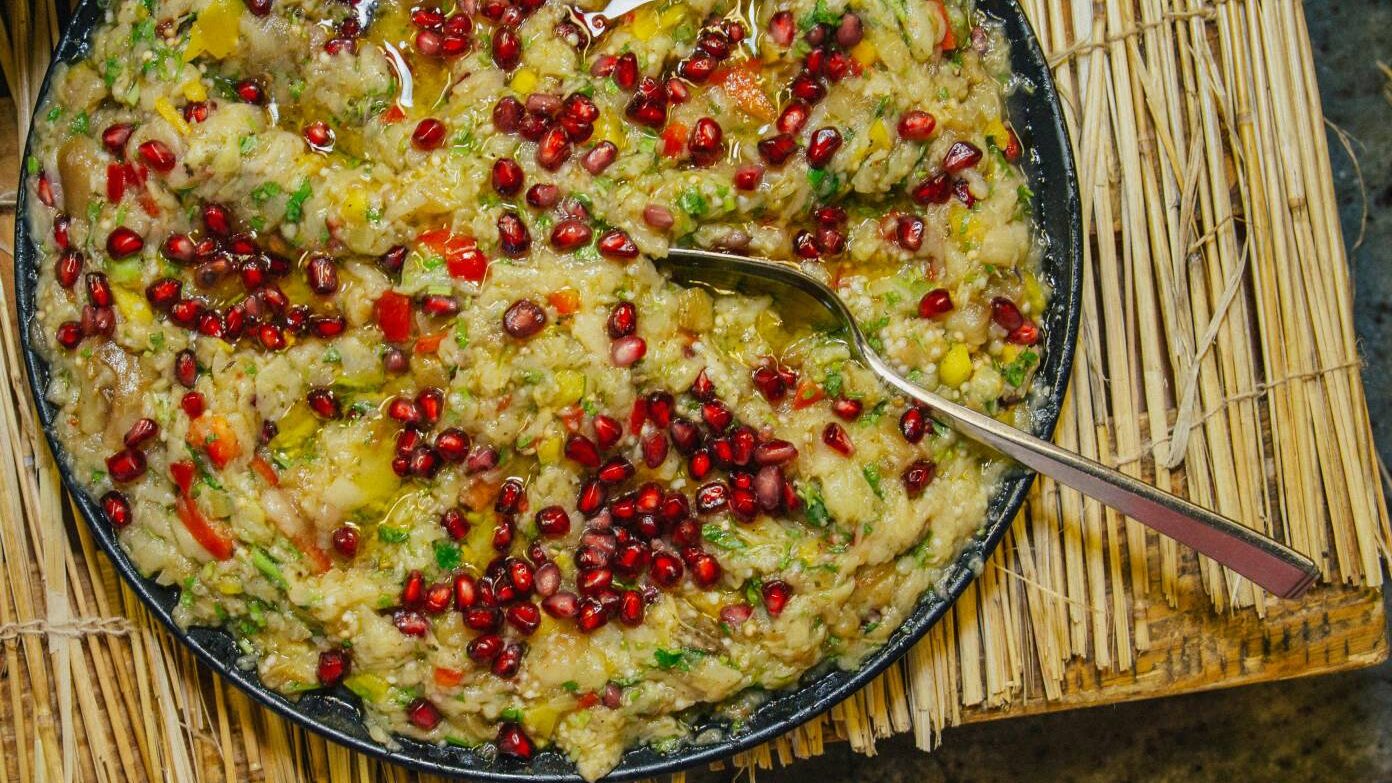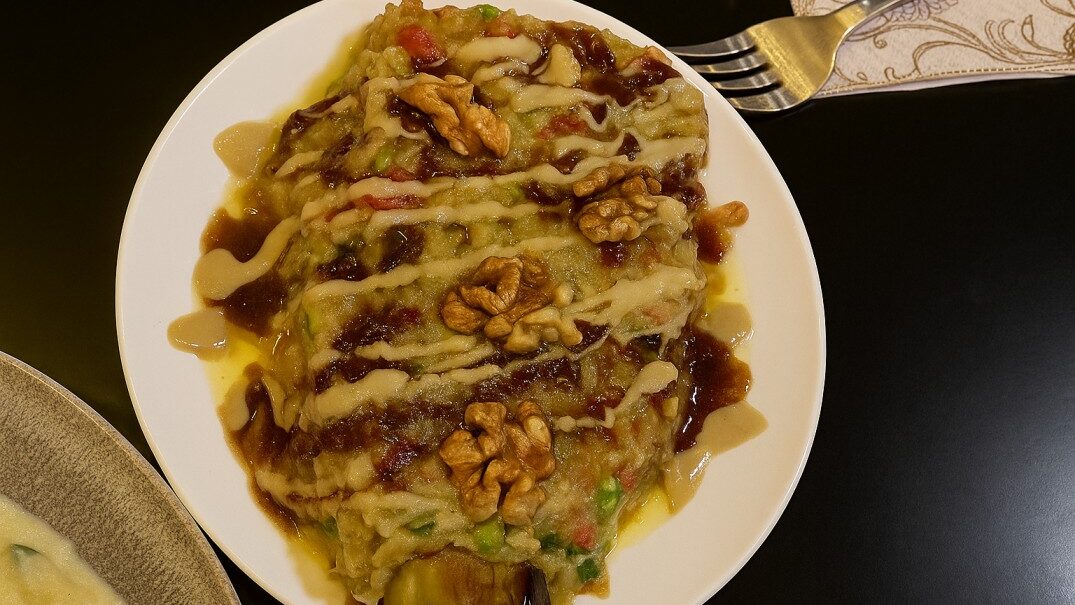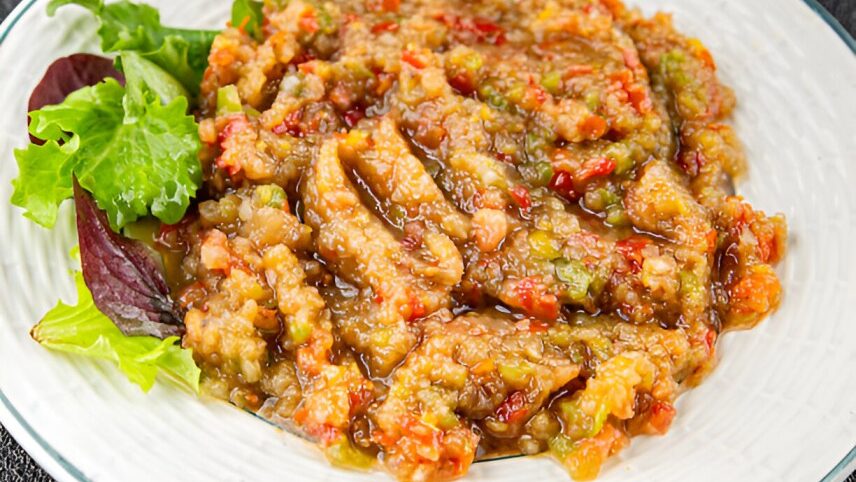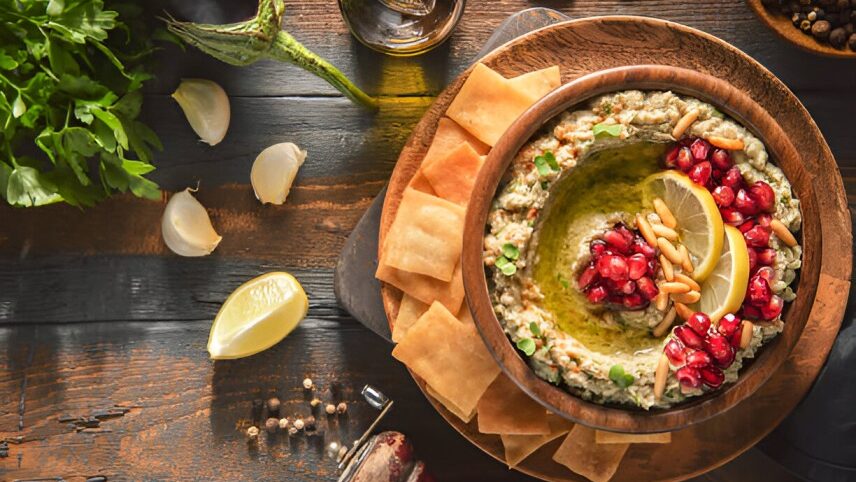🥄 The Dip That Broke the Internet Before the Internet Existed
A velvety, smoky dip lands on your table, glistening under the soft flicker of an old brass lantern. You scoop it with warm pita, lift it to your lips… and your world changes. You’re not just tasting eggplant. You’re tasting the wisdom of grandfathers, the flirtation of sugar daddies, and the secrets of Syrian kitchens passed down over centuries.
This is Baba Ghannoush.
And today, you’re about to discover why this seemingly humble dish has been seducing hearts and bellies from Damascus to Detroit for generations.

Who Is Baba Ghannoush, Really?
Let’s start with the name. Baba Ghannoush is a phrase that oozes charm:
- Baba (بابا) = Father, daddy, or an older respected man
- Ghannoush (غنوج) = Pampered, coquettish, spoiled, or sweet
Put it together and what do you get?
Baba Ghannoush = “Sugar Daddy”
Yes. The next time you post your mezze spread, remember that you’re dipping your bread into a Middle Eastern sugar daddy. Suddenly brunch feels spicier, doesn’t it?
But beyond the giggles lies a deep cultural root.
The True Origin – Where Did Baba Ghannoush Come From?
An Ancient Levantine Legacy
Baba Ghannoush was born in the Levant – a land that includes Syria, Lebanon, Jordan, and Palestine – long before national borders even existed. It emerged as a rural peasant dish, invented by those who cooked with what they had, turning simplicity into art.
The Birth Process: From Fire to Fame
- The Eggplant’s Journey
Eggplants were domesticated in India and spread west via Persian traders. In Syria, people learned to roast it directly on open flames, creating an unforgettable smoky aroma. - The Dip Evolution
Early versions were likely just mashed eggplant with olive oil and garlic. Over centuries, tahini was added, lemon brightened it, salt balanced it, and Baba Ghannoush as we know it was born. - The Name Story
Folk tales say a generous, gentle village elder (the Baba) loved this dish so much, they named it after him – Ghannoush, “the spoiled one”. Another theory suggests it was so delicious and smooth, it became the symbol of something that pampers your soul… hence Sugar Daddy.

The Sensory Seduction – Why Does Baba Ghannoush Hook People?
If you’ve ever wondered why your taste buds throw a party when you eat Baba Ghannoush, here’s why:
The Smokiness comes from fire-roasted eggplant, evoking a primal warmth.
Creaminess is delivered through tahini and olive oil, blending into velvety luxury.
A burst of brightness arrives as lemon cuts through with fresh acidity.
Garlic adds depth, offering earthy, lingering umami.
For crunch and garnish, a sprinkle of pomegranate seeds or parsley adds seductive texture and vibrant contrast.
It is this combination of smoke, cream, acid, and earthiness that makes it so addictive. One spoonful is never enough.
🍆 Baba Ghannoush vs Mutabbal – Are They the Same?
Here is where everyone gets confused:
🥄 Mutabbal
- Contains yogurt
- Has more tahini
- Usually spicier with extra garlic and sometimes chili
- Creamier and whiter in colour
🥄 Baba Ghannoush
- Traditionally has no yogurt
- Often includes diced tomatoes, parsley, or onions depending on the regional recipe
- Tends to have a chunkier, more rustic texture
In Syria and Lebanon, both are served together, and arguments erupt about which is superior. The answer? Eat both and let your tastebuds vote.

Regional Variations – A Trip Across the Middle East
Syria (The Original Baba)
Roasted eggplant, tahini, lemon juice, garlic, olive oil, sometimes with parsley or pomegranate seeds. Served as a mezze with hot flatbread.
Lebanon
Similar to Syria but occasionally mixed with diced tomatoes and onions for freshness.
Turkey (Patlıcan Salatası)
Roasted eggplant salad with olive oil, garlic, lemon, and sometimes yogurt – closer to Mutabbal in creaminess.
Iraq (Salatet Batinjan)
Eggplant mashed with garlic, lemon, onions, and parsley, sometimes without tahini at all.
Western Adaptations
You’ll find Baba Ghannoush with avocado, curry powder, or even kale in vegan cafés worldwide. Purists may weep, but innovation keeps the tradition alive in new forms.
How to Make Authentic Baba Ghannoush – The Syrian Way
Ingredients
- 2 large eggplants
- 3 tablespoons tahini
- 2 cloves garlic, crushed
- Juice of 1 large lemon
- Salt to taste
- Olive oil (generously drizzled)
- Garnish: pomegranate seeds, parsley, or smoked paprika
Method
- Roast the Eggplants
Grill them directly on gas flames, turning until the skin is charred and flesh is soft (about 10-15 min). For oven roasting, broil them at maximum heat until collapsed. - Cool & Peel
Let them rest in a covered bowl for 10 minutes to steam, then peel off the burnt skin. - Mash
Mash the eggplant roughly with a fork (never a blender – you’ll lose the rustic texture). - Mix
Add tahini, garlic, lemon juice, and salt. Taste and adjust. - Serve
Spread on a plate, drizzle with olive oil, garnish with parsley or pomegranate.
Eat with warm flatbread, fresh radishes, or by the spoonful if nobody’s watching.

Nutrition – Is Baba Ghannoush Healthy?
Here’s the good news for all health-conscious readers:
Low in calories
High in fibre (eggplant skin especially)
Rich in antioxidants (thanks to eggplant’s dark skin and tahini’s sesame seeds)
Heart-healthy fats from olive oil and tahini
So yes – your sugar daddy is also your fitness trainer.
Why Should You Care About Baba Ghannoush?
Because food is more than calories. It is:
- Culture – Taste Syria without a flight
- Connection – Share it with friends and create memories
- History – Eat the same dish your ancestors ate centuries ago
- Identity – Understand the stories behind the recipes you post on Instagram
Every bite of Baba Ghannoush is a bite of a world that survived wars, empires, migrations, and yet still brings warmth to dinner tables globally.
Fun Facts to Hook Your Friends
Baba Ghannoush is vegan, gluten-free, keto-friendly, and paleo – the ultimate inclusive dish.
In some Arab dialects, calling someone Ghannoush is a flirty compliment.
Some historians believe it was originally a salad eaten by monks in ancient Christian monasteries in Syria, where they avoided meat and dairy.
The charred eggplant aroma you smell while roasting is the same compound found in smoked wood and barbecue. This is why Baba Ghannoush feels like comfort food.
The Legacy of The Smoky Sugar Daddy
Next time you sit at a mezze table, look at Baba Ghannoush and remember:
He is the wise elder who teaches you humility, the sugar daddy who spoils your taste buds, and the smoky seducer who reminds you that simplicity, when done right, is unforgettable.
So go ahead.
Scoop him up.
Let him whisper centuries of Syrian secrets into your mouth, and taste the timeless truth that food is love, history, and identity… all mashed into one delicious bite.
Is Baba Ghannoush Vegetarian-Friendly?
Absolutely. Baba Ghannoush is not just delicious – it’s a dream come true for vegetarians and vegans. With its smoky roasted eggplant, creamy tahini, and fresh lemon, it’s entirely plant-based, nutrient-rich, and packed with heart-healthy fats. On our Syria tours, we make sure to include Baba Ghannoush in every mezze spread so you can experience its true flavours at local family kitchens and hidden old-city restaurants. Because tasting Baba Ghannoush in Syria isn’t just eating – it’s discovering the warmth, generosity, and timeless recipes of this beautiful land.
Did you love learning about Baba Ghannoush? Share this article with a friend who still thinks it’s just mashed eggplant. Let them discover the smoky sugar daddy hiding on their plate.
📌 Next in this Series
Coming soon:
“Mutabbal: The Creamy Cousin Who Thinks He’s Better Than Baba Ghannoush”
